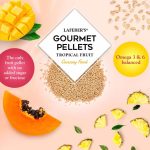
The first question you may ask is what do Guinea Pigs eat? There are a few different options, including commercial foods, hay, fruits, and treats. Alfalfa hay has the highest calcium content, while Timothy hay has a lower calcium content but higher fibre content. Timothy hay is the most ideal option for adult Guinea Pigs because it helps control the growth of their teeth and keep their digestive tract healthy.
Contents
Fruits
Fruits are an excellent source of fiber and vitamins for guinea pigs. A few fruits that are safe to feed guinea pigs include dragon fruit, honeydew melon, pear, and pineapple. However, be aware of potential toxins in certain fruits.
Freshly sliced pineapple is safe to feed to guinea pigs. Pineapples are high in Vitamin K and magnesium, so guinea pigs can safely eat a piece once or twice a week. Bananas contain high levels of sugar and should only be given to guinea pigs once or twice a week.
While fresh fruit is safe to give to guinea pigs, excessive amounts can lead to mouth sores and health problems. Some fruits may be too acidic for guinea pigs, so only feed them in small amounts. Avoid citrus fruits, since their high acidity can cause mouth sores and bleeding inside the mouth. Additionally, excessive amounts of fruit may lead to a large amount of weight gain for your pig.
Fruits are an excellent source of fiber and Vitamin C. You can feed guinea pigs orange peels on occasion. Just remember to remove the pits or seeds before feeding. As with all new foods, make sure to introduce new fruits and vegetables slowly. If your guinea pig exhibits signs of diarrhea, reduce the amount of fresh fruit for a few days before reintroducing it again.
Hay
Hay is a natural food source for guinea pigs, and there are several kinds of hay that are suitable for the pet. These include meadow hay and Timothy hay. Both types of hay contain the necessary nutrients that your pet needs to grow up healthy and strong. Timothy hay is a good source of vitamin C and calcium. Some varieties are also rich in fibre.
Hay is also a great option for indoor environments. It can be easily stored in a cardboard box as long as it is properly sealed and not exposed to damp conditions. Some hays are more suitable for guinea pigs than others, but you should avoid oat or barley hay as these are high in sugars. High sugar content in a guinea pig’s diet can cause upset digestive system.
The best hay for guinea pigs should have a clean, fresh smell. It should not smell musty, and should be green in colour. Greener hays have higher vitamin content, which guinea pigs love. The hay should also be free of additives. Hay should also contain leaves and stems, and not be contaminated with pesticides.
Commercial food
Depending on their age and stage of life, guinea pigs need different nutritional requirements. Juvenile cavies, for example, require a high-protein diet to grow and develop their muscles. Older cavies may require a senior formula with additional nutrients. Your vet can help you determine the right diet for your pet. Ideally, commercial guinea pig food should contain 12-20% protein.
In the wild, guinea pigs eat a wide variety of food. However, domesticated guinea pigs don’t get enough nutrition from fruits and vegetables. A high-quality commercial food for guinea pigs will meet their nutritional requirements and contain 18-20% crude protein.
Hay is another important part of guinea pig nutrition. It contains high fiber and is also good for their teeth. Hay should be provided to your guinea pigs in plenty. It should be given to them throughout the day, so they can have a wide variety of food. In addition to hay, they can be given fresh vegetables. Each day, give them about a cup of vegetables and hay. Leafy greens should make up most of the vegetables you offer. You can also add some broccoli, red or green pepper, and carrots.
Treats
When choosing guinea pig treats, be sure to choose items that your pet enjoys eating. Hay is a favorite treat among many guinea pigs and is full of fiber and nutrients. Hay also keeps guinea pigs full and helps prevent long, brittle teeth that may lead to infection.
The best guinea pig treats contain probiotics, which promote digestive tract health and immune system function. You can find them in pet stores. Be sure to check for the label and check for ingredients. Try to avoid treats that are high in sugar or have artificial ingredients.
Fruits are another great treat for guinea pigs. They can eat a wide variety of fruit, including apple, pears, carrots, and papaya. You can also give your pet pieces of cucumber, bell pepper, or other veggies.



